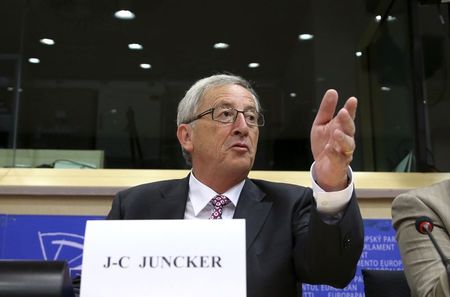Juncker tells eurosceptics he is no federalist

By John O’Donnell
BRUSSELS (Reuters) – Jean-Claude Juncker denied on Tuesday that he favoured a federal European superstate as he sought the support of British Conservatives and other eurosceptics for his presidency of the European Commission, but his assurances drew a cool response.
The designated head of EU executive delivered his message to the European Conservatives and Reformists (ECR) group in the European Parliament 10 days after British Prime Minister David Cameron failed to block his path to Brussels’ top job.
“Despite what you may read in the British press, I do not want a United States of Europe,” the former Luxembourg prime minister told the lawmakers, according to one person present.
“I do not believe that Europe can be constructed against the nation state.”
As he visited the main political groups to explain his vision, Juncker, 59, attempted to show that he had understood some criticism levelled by eurosceptics at Brussels.
“The EU has become too bureaucratic,” he told a crowded room of conservative lawmakers. “Not every problem in Europe is a problem for Europe.”
Speaking after the meeting, the leader of the 70-member ECR group said that while they had given Juncker “a fair hearing” there were still areas of disagreement.
“We have had a robust exchange on a range of issues,” British Conservative Syed Kamall told journalists.
“Where he spoke about things such as the digital single market or labour flexibility … we wanted to support that,” he said. “Where he spoke about the high representative for foreign affairs being effectively a foreign minister … we didn’t give him a round of applause.”
If as expected he is endorsed by a majority in the European Parliament on July 16, Juncker is set to assume office for five years from November, taking charge of an institution responsible for proposing EU law and policing existing rules.
The Commission also leads trade negotiations and a vice-president coordinates the EU’s common foreign policy.
EU leaders nominated Juncker last month despite opposition from Britain, which depicted him as an old guard federalist and Brussels insider, unsuited to the task of shaking up the executive body which proposes and enforces EU laws.
Resolving the British question promises to be one of his most delicate tasks. Cameron has promised to renegotiated Britain’s relationship with the EU and put the outcome to an in/out referendum in 2017 if he is re-elected next year.
He has said he will back continued membership provided Brussels agrees to reforms ranging from cutting red tape to tightening rules on migration within the EU.
(Reporting By John O’Donnell; Editing by Paul Taylor)